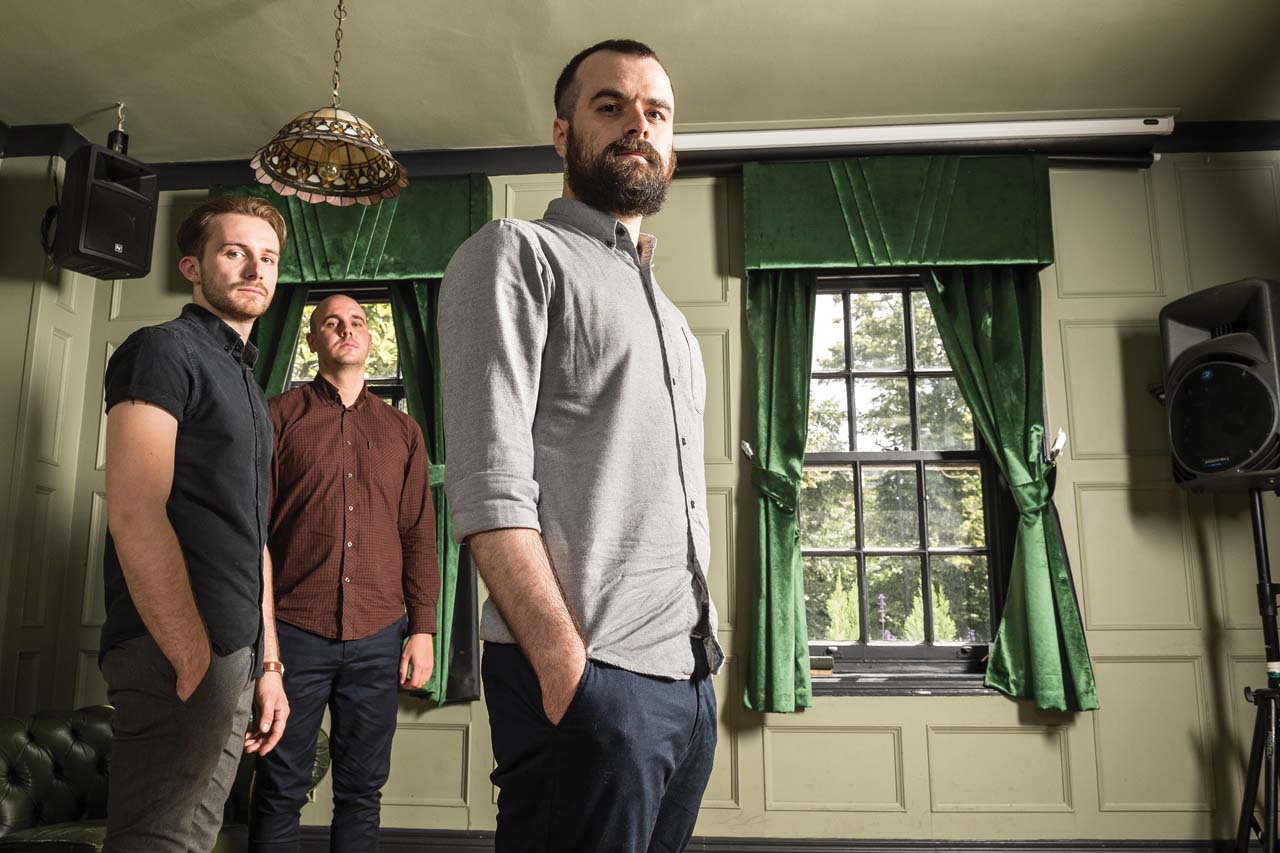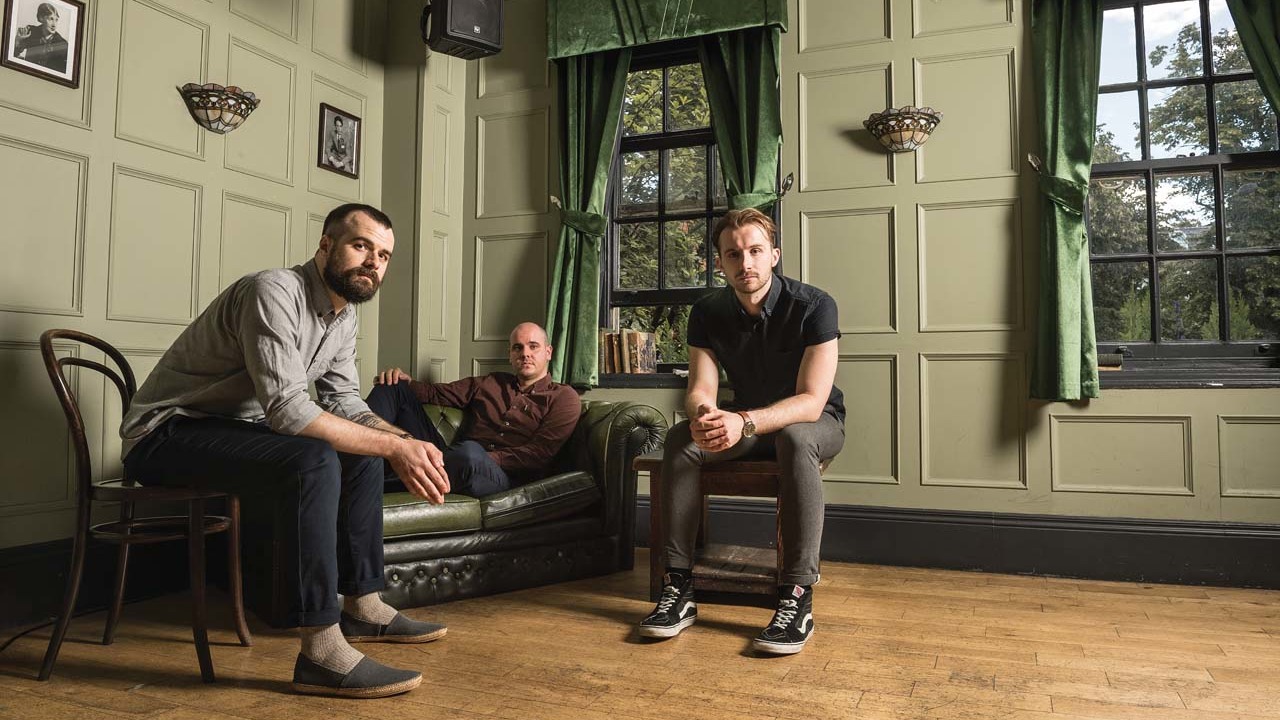When Andrew Groves was 14, he went on a family holiday to the Greek island of Zaente. He used this time to devour huge textbooks on modular synths, re-reading each page.
“I would sordidly read about the theory,” admits the Arcane Roots singer. “I really loved them and I wanted one, and it just never happened, so it was a dirty little secret.”
In September 2015, he bought himself a Doepfer A-100 analogue synthesiser for his 28th birthday, opening up a whole new world for his guitar-driven band. The result is second album Melancholia Hymns, an electronically tinged, melodic rock record than shuns the shouty bombast of their debut, 2013’s Blood & Chemistry, as well as their four EPs. It’s a bold reinvention of their sound: a layered, experimental journey addressing some of life’s heaviest themes.
“This is definitely our proggiest statement by far!” Groves exclaims.
The need for this change of direction was bubbling under the surface around the time of their last EP, 2015’s Heaven & Earth, their first release for Easy Life, a Sony offshoot. They wrote 250 songs for it, but only used five. They would turn up to venues to play, not caring whether the sound was good, because they were confident they could ace the show regardless. After a decade as a band, being in Arcane Roots felt easy. Comfortable.
“We were thinking, ‘What do we do to challenge ourselves again?’” says Groves. “We hit 10 years, and it feels like there’s more to do. There’s more than just black and white…”
The synth reignited Groves’ interest in electronic music, colouring his world. As a teenager, he had listened to The Cinematic Orchestra and Trentemøller, and now he was checking out BT, Venetian Snares, Aphex Twin, Thom Yorke’s electronic stuff and Björk, following recommendations friends had been making for years. He then had to convince his bandmates, bassist Adam Burton and new drummer Jack Wrench, to make a left turn with their music. “We leapt in head first!” Burton laughs.
Work began in late 2015. As Groves got deeper into synths, he bought a Prophet 08, and began learning piano and violin. His interests turned to classical, to James Blake, and Keith Jarrett’s jazz; then to the soundtracks of Jóhann Jóhannsson, Ólafur Arnalds, Trent Reznor and Jonny Greenwood, and the work of Richard Devine. Suddenly, the possibilities for Arcane Roots seemed boundless. Their minds opened to new ways of composing.
“For the first time, a lot of our stuff was not written in a rehearsal room. It was just written at a computer,” says Groves. “I had this idea, we’d build it up, we’d put in the parts and then be like, ‘Let’s walk away from it. What’s the best thing to do? If it’s 100 violins, let’s do that. It could be Justin Timberlake’s Like I Love You right up until the second chorus, and then it’s Stravinsky!’”
His voice rises and his eyes widen with enthusiasm. Today we’re talking in a quiet bar in central London, the trio dressed uniformly in grey T-shirts. But Groves, in the centre, is clearly their well-mannered eccentric genius leader, talking in long, rambling sentences and gesticulating wildly. Back in the early days, Arcane Roots wrote at a shared house they dubbed ‘Arcane Residence’. For this record, Burton and Wrench would stay at Groves’ place in south-west London, for long sessions they jokingly refer to as the ‘Conservatory Club’.
“A lot of the sessions were based around reminding ourselves of what we were doing,” says Groves. “We would end up falling on comfort, on a familiar pattern, and then we would just be like, ‘Let’s get rid of the riff! Let’s really concentrate on it being the best thing and not have any expectations about what it should be.’”
The first song they finished was Curtains, which starts from a brooding, fragile foundation of electronics and keys, and swells to a stabbing crescendo that incorporates those riffs at the last minute (“We dipped our toe into the water,” explains Groves). They released it in December 2016, nervous and excited to hear people’s reaction. When it was positive, their course was set. Ensconced in London’s Decimal Studios until April, with producer and ‘fourth member’ Chris Coulter, they recorded nine more songs that transcend their alt rock template. Groves cites indie pop singer Feist’s backing band, and her 2011 record Metals, as an inspiration when it came to dialling back the heavy and playing with dynamics and space.
“That album’s magic. It’s really hard,” Groves says. “And we’ve always said the hardest thing of any record is playing the clean parts. The distortion parts are all easy. All the riffs, so easy. Anything that anyone fanboy or fangirls over, they’re the easy things. Getting something to resonate cleanly when all eyes are on you, there’s no room for error.”
He was also inspired by his prog upbringing. On previous Arcane Roots records, Groves has written about his own life and relationships. For Melancholia Hymns, he was determined to turn his gaze outwards, taking on universal themes instead.
- Listen to new Arcane Roots track Matter
- Arcane Roots at Bush Hall, London - live review
- The TeamRock+ Singles Club
- TeamRock Radio app back on Apple’s app store
“Growing up, I wasn’t even into rock music at all,” he reveals. I only listened to Pink Floyd, King Crimson, Van der Graaf Generator… all these kinds of bands. My dad got me into them, and that’s the kind of guitar playing I was into. So I loved the idea of making something that was timeless, very much like The Dark Side Of The Moon. Those subject matters are still just as pertinent today as they were then. Everyone still worries about time, and money, and age, and madness. Everything was so personal before, about me and my life. And I was like, ‘Well, it’s now or never.’ Same with the music. It was like, ‘Just do something – don’t be afraid to say it.’”
In the studio, he would get out his phone to follow vocal warm-ups, but end up reading depressing stuff about today’s political situation that would feel “like a stone dropping” inside of him. His mood would turn, and he would insist on taking a break. In the midst of trying to create a “beautiful achievement”, the world was turning to shit. He had found his lyrical inspiration. Melancholia Hymns is beautiful, but it also speaks of decay.
“I avoid politics like the plague,” he begins. “Before this, we played with bands who would rant in the middle of the set, or they would get off the stage and start tying their microphone around their arm, and that’s just not me. I’d be like, ‘Don’t come near me.’ I was uncomfortable. And much against any sensibility I’ve had before, I was like, ‘Well, they seem like they need to do something about this. And maybe if I can get over myself and say something, no matter how armchair politics…’ It felt like we had a responsibility to say something, no matter how small. So it kind of became a ‘this is how things are in 2017’ biopic.”
In 2017, Arcane Roots are in an altogether different place from where they started. They’ve previously supported bands such as Muse, Biffy Clyro and Twin Atlantic, as well as playing rock and metal festivals. They’ve found favour with younger fans, but hope Melancholia Hymns will broaden their appeal and attract an older, proggier crowd.
“It’s something we really desire, and I don’t see any point in the great rock pretence of being forever young,” says Groves. “I like the idea that yeah, we are obviously getting older, and I don’t wanna be Slipknot, playing biblical shit at 50, do you know what I mean? It’s cool, some people manage it, but at the same time I feel like we can only be honest.”
To that end, they’re planning to change up their live shows. After so much experimentation during the writing sessions for Melancholia Hymns, they ended up with multiple versions of the same songs, and are keen to surprise people with them.

“I like the idea that you go and see a song live, and we’ll play it in a completely different manner,” enthuses Groves. “When we finished the record, it was more of an acceptance that this is just the beginning – these are the songs we are presenting for now. I like the idea of exciting people to be like, ‘On the record it’s cool, but you should hear the version they did at 2000trees!’, and then we do a nice little recording of it and put that out. And it keeps evolving.”
Beyond that, they have big dreams for their tours, taking visual cues from Nine Inch Nails and Four Tet, along with events company Secret Cinema. At their screenings, ticket-holders in fancy dress are plunged into an immersive theatre-based experience themed around a movie, before watching the movie itself.
“We wanna take it further,” Groves says. “It’s the difference between making a film and doing it well, and making a film and making it into a Secret Cinema type of thing. A whole experience. You turn up someplace where you wouldn’t normally come to a gig, and you get handed something, and you don’t know what it’s for, and a story unfolds.”
Now Arcane Roots have opened a Pandora’s box of ideas, it’s clear they’re never closing the lid. Groves wants their shows and music to be interesting for fans, but he also wants to live up to his own creative standards. In this intrepid, risk-taking phase, he’s daring to see how far his dreams can take him.
“If we’re going to give it everything – and we’ve given it 10 years, and all our money, and all our youth and happiness – I at least want to go, ‘Well, look, I thought that was really good.’” He lowers his voice, leans in, and sounds slightly apologetic for his language. “At least I’ve had the bollocks, I suppose, to try it…
“It’s like dancing at a party. Imagine if you were like, ‘Look, I reckon I could do some amazing dance moves,’ but you held back 10, or five, or one per cent. People would be like, ‘Who’s this guy?’ But if you just went for it, dancing like Phoebe from Friends, they’d be like, ‘Wow, you’re going to be in the new Fatboy Slim Praise You video!’”
A British band with a prog background and limitless ambitions? After hearing Melancholia Hymns, you might be called to worship.
Melancholia Hymns is out on September 15 via Easy Life/Red Essential. For more information, see www.arcaneroots.com.
Taking Root
Andrew Groves’ prog top five.
Animals - Pink Floyd (1977)
“While I was pretty much brought up on Pink Floyd’s The Dark Side Of The Moon, it was really when I discovered their album Animals that I truly had my eyes opened to what could be done musically within a record. All of the transitions and long modulations between the tracks still influence me right up to this day.”
Discipline - King Crimson (1981)
“I got into King Crimson after trawling through some of John Frusciante and Omar Rodríguez-López’s influences. It also helped me bridge the gap somewhat between me and my guitar teacher who was deeply into jazz fusion artists like Allan Holdsworth et al. Songs like Frame By Frame and the title track were big influences on my guitar playing and songwriting.”
Frances The Mute - The Mars Volta (2005)
“It actually took me a long time to get into The Mars Volta, as I was still very prog and jazz-oriented at that time. But once I heard Cygnus… Vismund Cygnus I was hooked, and I avidly followed them until they split up, as well as Omar Rodríguez-López’s solo works. Incredible musicianship, and I remember just feeling like what they were improvising was impossible.”
This Binary Universe - BT (2006)
“You may argue if this is prog. I assure you it is. It was a beautiful introduction to electronica for me, and one that I could stomach and really appreciate. A more or less one-off album by BT and a departure from his usual dance and EDM-based material. This is just so very special, and just modulates and saunters into so many genres and moods. Only listen when you have the time to go the full hog.”
Sylva - Snarky Puppy & Metropole Orkest (2015)
“Right up in my top three favourite albums ever. Again, in a small departure from their normal repertoire, they chose to write an album with the Metropole Orkest instead of just collaborating. Just incredibly beautiful, from start to finish, and musicianship like no other. Real magic. Listen with extreme envy.”

